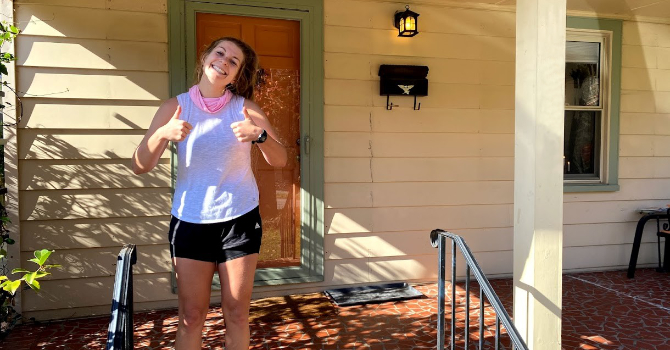I woke up at 5 a.m., ate a bowl of oatmeal, poured some neon blue Gatorade into a tiny water bottle.
I woke up my husband. “Hey, it’s time,” I whispered.
With a few groggy grunts from him and a few bursts of nervous chatter from me, we slipped into running shorts and shirts. In a matter of minutes, we were out the door, into the dawning peace of a Saturday morning. My husband kept checking his watch, monitoring our pace.
“Slow it down,” he said. “Don’t push it.”
I thought about how we must look to the occasional passing car -- just a couple out for a nice weekend jog, albeit an early one.
They wouldn’t have been wrong, but they might not have guessed that my husband would turn around at mile 5. I would turn around at mile 13.1.
That morning, I was running my first marathon.
Under any circumstances, running a marathon is hard. Running it solo presents its own set of challenges.
Water stations, crowds of cheering onlookers bearing signs and smiles, a medal (no matter what your final time) -- none of the standard race day fanfare was part of that November morning. Instead, I trotted along Durham’s American Tobacco Trail, pulling my mask up over my nose and mouth each time a cyclist or fellow runner approached.
Of course, the standard race day fanfare was what I had signed up for, once upon a time -- back when terms like “pandemic” and “social distancing” weren’t part of our daily vocabulary.
My Raleigh race had been scheduled for Nov. 1, 2020. As the year wore on, though, it became ever clearer that such an event would not be happening.
But running a marathon had already moved from my “Maybe? Someday? I don’t know?” list to my 2020 goals list. I was determined and started training anyway.
If this were a movie, it’d be tempting to insert the inspirational montage here, with a message about the importance of grit, independence, etc.
But looking back on my race day, I see a different message, something of a microcosm of what it takes to lead and live -- in pandemic times and in all other times. In this slow-motion video set to stirring instrumentals, I am not going it alone.
When I reached mile 20, I texted my husband with my location.
“Woohoo!!!!!” he replied. “Keep going strong! Know that I’ll see you soon!”
This was the plan. After running back to our house, he had been waiting for me to text when I reached that point. He would then hop on his bike to meet up and cycle alongside me for the final miles.
And he did. “Your form still looks great!” he said, as I plodded along beside him. “You don’t look like you’ve been going 20-plus miles!”
I told him I needed to walk for a minute.
“OK,” he said, “but keep it short -- you’re so close!”
When I hit the 26.2-mile mark, he cheered and hugged me as I laughed and tried not to throw up.
I could have tried to do it alone, I suppose. I could have set my alarm, run through the morning hours, arrived back at home with the milestone under my belt.
But that wasn’t the way I wanted to do it. In fact, something in me knew I might not finish if I didn’t have a trusted voice, an encouraging presence, beside me.
It is tempting, of course, to cue a montage dedicated to solitary achievement, to the belief that we have what it takes within us: “I can do it! Bring it on, world!”
The experts say otherwise, though. Ronald Heifetz and Marty Linsky, for instance, caution against “the lone warrior strategy of leadership.” To combat it, they emphasize the value of confidants -- people invested in your success and well-being who offer you a space to be fully, genuinely heard.
“Confidants can put you back together again at the end of the day when you feel like Humpty Dumpty, all broken to pieces,” they write. “They can remind you why it’s worth getting out there and taking risks in the first place.”
Put another way, confidants can yell at you to keep going when your feet don’t want to take another step and your legs just want to rest, when all you want to do is stop. They can remind you why you wanted to do this in the first place.
The past year has taught us a lot about how much we need each other. Maybe we already believed that, on a theoretical level, but the profound truth of God’s statement in Genesis 2:18 (NRSV) hits a little differently now: “It is not good that the man should be alone …”
So who rides beside you as you run down the trail wondering how you got yourself into this? And whom might you ride alongside?








